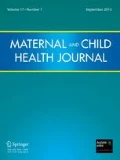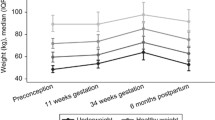Abstract
To describe the gestational month-to-month weight change, obstetric and lifestyle factors influencing postpartum weight retention (PPWR) and to suggest possible interventions to prevent PPWR. This study was part of a larger research project concerning maternal weight change after childbirth. 343 women were recruited on five maternity wards in the Antwerp region, Belgium. Weight and height were assessed by the researchers during two home visits at 3 and 14 months postpartum and participants completed a questionnaire investigating obstetric and lifestyle factors during the first home visit. The monthly weights in between the home visits were self-reported by the participants. Full data were available for 75 women. One year after childbirth 52.0 % of the women faced postpartum weight retention. The different monthly weight points within the changes differed significantly from each other up to sixth months postpartum. Prepregnancy weight, exceeding the recommendations from the Institute of Medicine (IOM) concerning weight gain during pregnancy, smoking behaviour and exercising during pregnancy significantly influenced the postpartum weight change. The amount of weight gained during pregnancy, breastfeeding, possible postpartum depression and experiencing a shortage of information concerning the weight change after childbirth significantly influenced postpartum weight retention. Weight gain during pregnancy, exceeding IOM-criteria, breastfeeding, depression and lack of information determine PPWR and can be modulated by interventions such as routine weighing or screening of pregnant women. Several of these influencing factors can be preventively influenced by health care workers. Overall, we believe women could benefit from more guidance before, during and after pregnancy. Moreover, we recommend to reintroduce routine weighing of pregnant women as weight gain during pregnancy seems one of the most important factors involved in PPWR.

Similar content being viewed by others
References
Schmitt, N. M., Nicholson, W. K., & Schmitt, J. (2007). The association of pregnancy and the development of obesity: Results of a systematic review and meta-analysis on the natural history of postpartum weight retention. International journal of obesity (London), 31(11), 1642–1651.
Walker, L. O., Sterling, B. S., & Timmerman, G. M. (2005). Retention of pregnancy-related weight in the early postpartum period: Implications for women’s health services. Journal of Obstetric, Gynecologic, and Neonatal Nursing, 34(4), 418–427.
Kac, G., Benicio, M. H., Velásquez-Meléndez, G., & Valente, J. G. (2004). Nine months postpartum weight retention predictors for Brazilian women. Public Health Nutrition, 7(5), 621–628.
Amorim, A. R., Rössner, S., Neovius, M., Lourenço, P. M., & Linné, Y. (2007). Does excess pregnancy weight gain constitute a major risk for increasing long-term BMI? Obesity (Silver Spring), 15(5), 1278–1286.
Calfas, K. J., & Marcus, B. H. (2007). Postpartum weight retention: A mother’s weight to bear? American Journal of Preventive Medicine, 32(4), 356–357.
Shrewsbury, V. A., Robb, K. A., Power, C., & Wardle, J. (2009). Socioeconomic differences in weight retention, weight-related attitudes and practices in postpartum women. Maternal and Child Health Journal, 13(2), 231–240.
Herring, S. J., Rich-Edwards, J. W., Oken, E., Rifas-Shiman, S. L., Kleinman, K. P., & Gillman, M. W. (2008). Association of postpartum depression with weight retention 1 year after childbirth. Obesity (Silver Spring), 16(6), 1296–1301.
Oken, E., Taveras, E. M., Popoola, F. A., Rich-Edwards, J. W., & Gillman, M. W. (2007). Television, walking, and diet: Associations with postpartum weight retention. American Journal of Preventive Medicine, 32(4), 305–311.
Gunderson, E. P., Rifas-Shiman, S. L., Oken, E., Rich-Edwards, J. W., Kleinman, K. P., Taveras, E. M., et al. (2008). Association of fewer hours of sleep at 6 months postpartum with substantial weight retention at 1 year postpartum. American Journal of Epidemiology, 167(2), 178–187.
Walker, L. O., Freeland-Graves, J. H., Milani, T., Hanss-Nuss, H., George, G., Sterling, B. S., et al. (2004). Weight and behavioral and psychosocial factors among ethnically diverse, low-income women after childbirth: I. Methods and context. Women & Health, 40(2), 1–17.
Walker, L., Freeland-Graves, J. H., Milani, T., George, G., Hanss-Nuss, H., Kim, M., et al. (2004). Weight and behavioral and psychosocial factors among ethnically diverse, low-income women after childbirth: II. Trends and correlates. Women & Health, 40(2), 19–34.
Amorim, A. R., Linne, Y. M., & Lourenco, P. M. C. (2007). Diet or exercise, or both, for weight reduction in women after childbirth. Cochrane Database of Systematic Reviews, (3), CD005627. doi:10.1002/14651858.CD005627.pub2.
Davis, E., & Olson, C. (2009). Obesity in pregnancy. Primary Care, 36(2), 341–356.
Nuss, H., Clarke, K., Klohe-Lehman, D., & Freeland-Graves, J. (2006). Influence of nutrition attitudes and motivators for eating on postpartum weight status in low-income new mothers. Journal of the American Dietetic Association, 106(11), 1774–1782.
Hinton, P. S., & Olson, C. M. (2001). Postpartum exercise and food intake: The importance of behavior-specific self-efficacy. Journal of the American Dietetic Association, 101(12), 1430–1437.
Kac, G., Benício, M. H., Velásquez-Meléndez, G., Valente, J. G., & Struchiner, C. J. (2004). Breastfeeding and postpartum weight retention in a cohort of Brazilian women. American Journal of Clinical Nutrition, 79(3), 487–493.
Linné, Y., Dye, L., Barkeling, B., & Rössner, S. (2003). Weight development over time in parous women–the SPAWN study–15 years follow-up. International Journal of Obesity and Related Metabolic Disorders, 27(12), 1516–1522.
Krummel, D. A. (2007). Postpartum weight control: A vicious cycle. Journal of the American Dietetic Association, 107(1), 37–40.
Kac, G., D’Aquino Benicio, M. H., Valente, J. G., & Velásquez-Meléndez, G. (2003). Postpartum weight retention among women in Rio de Janeiro: A follow-up study. Cadernos de Saúde Pública, 19(Suppl 1), S149–S161.
Worldwide I. Obesity: Global epidemic. Innovating people solutions (2007), 14(1).
Kac, G., Benício, M. H., Velásquez-Meléndez, G., Valente, J. G., & Struchiner, C. J. (2004). Gestational weight gain and prepregnancy weight influence postpartum weight retention in a cohort of Brazilian women. Journal of Nutrition, 134(3), 661–666.
Viswanathan, M., Siega-Riz, A. M., Moos, M. K., Deierlein, A., Mumford, S., Knaack, J., et al. (2008). Outcomes of maternal weight gain. Evidence Report/Technology Assessment, 168, 1–223.
El-Sayed, A. M., Scarborough, P., & Galea, S. (2011). Ethnic inequalities in obesity among children and adults in the UK: A systematic review of the literature. Obesity Reviews, 12(5), e516–e534.
Weight gain during pregnancy: Reexamining the guidelines. Institute of Medicine, (2009).
Cox, J. L., Holden, J. M., Sagovsky, R. (1992). Edinburgh postnatal depression scale (EDS-NL).
Institutet K, IPAQ-group. International physical activity questionnaire. (2005).
van Strien, T. (2005). Nederlandse vragenlijst voor eetgedrag, NVE 2005. Amsterdam: Boom Test Uitgevers.
Wacker, S. (2010). IBM SPSS statistics. 19th ed. Chicago 2010.
Acknowledgments
This study was funded with a PWO grant of the Karel de Grote University College and acknowledged by the Flemish government. We thank the participating hospitals for their help in recruiting the women and the women themselves for their effort and participation in the study. We also show great gratitude for the master students Charlotte Deckers, Charlotte Guiette, Kathleen Biesmans, Eline Dumont and Bénédicte Bogaerts for their cooperation in recruiting and visiting women. Finally, we would like to thank the study coordinating committee from Karel de Grote-Hogeschool and the advisory committee attached to this particular study.
Author information
Authors and Affiliations
Corresponding author
Rights and permissions
About this article
Cite this article
Biesmans, K., Franck, E., Ceulemans, C. et al. Weight During the Postpartum Period: What Can Health Care Workers Do?. Matern Child Health J 17, 996–1004 (2013). https://doi.org/10.1007/s10995-012-1077-9
Published:
Issue Date:
DOI: https://doi.org/10.1007/s10995-012-1077-9




